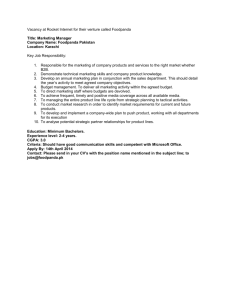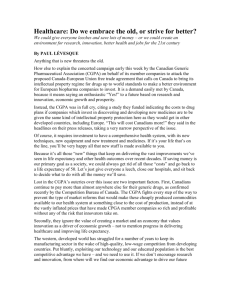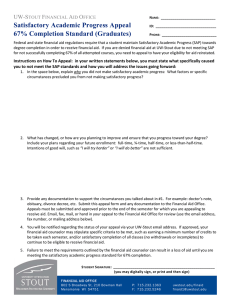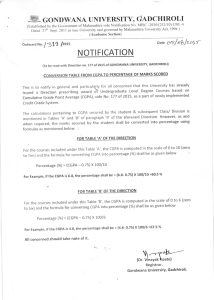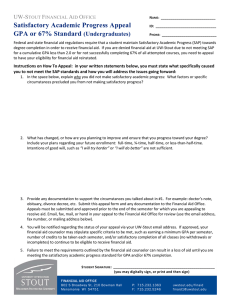Satisfactory Academic Progress
advertisement
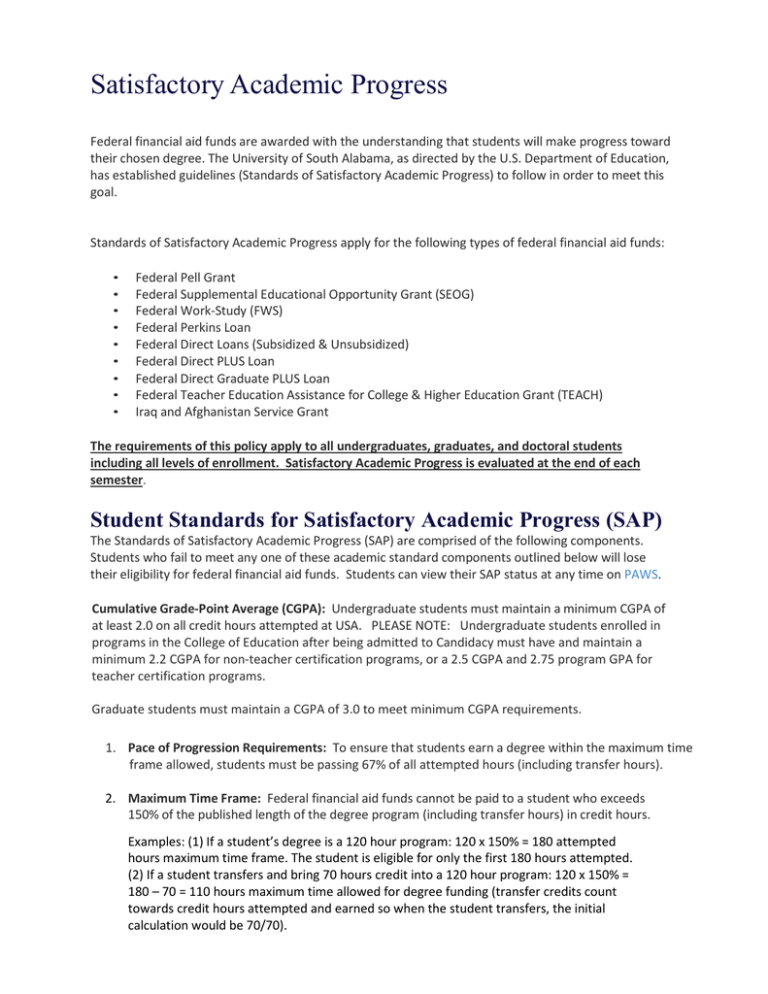
Satisfactory Academic Progress Federal financial aid funds are awarded with the understanding that students will make progress toward their chosen degree. The University of South Alabama, as directed by the U.S. Department of Education, has established guidelines (Standards of Satisfactory Academic Progress) to follow in order to meet this goal. Standards of Satisfactory Academic Progress apply for the following types of federal financial aid funds: • • • • • • • • • Federal Pell Grant Federal Supplemental Educational Opportunity Grant (SEOG) Federal Work-Study (FWS) Federal Perkins Loan Federal Direct Loans (Subsidized & Unsubsidized) Federal Direct PLUS Loan Federal Direct Graduate PLUS Loan Federal Teacher Education Assistance for College & Higher Education Grant (TEACH) Iraq and Afghanistan Service Grant The requirements of this policy apply to all undergraduates, graduates, and doctoral students including all levels of enrollment. Satisfactory Academic Progress is evaluated at the end of each semester. Student Standards for Satisfactory Academic Progress (SAP) The Standards of Satisfactory Academic Progress (SAP) are comprised of the following components. Students who fail to meet any one of these academic standard components outlined below will lose their eligibility for federal financial aid funds. Students can view their SAP status at any time on PAWS. Cumulative Grade-Point Average (CGPA): Undergraduate students must maintain a minimum CGPA of at least 2.0 on all credit hours attempted at USA. PLEASE NOTE: Undergraduate students enrolled in programs in the College of Education after being admitted to Candidacy must have and maintain a minimum 2.2 CGPA for non-teacher certification programs, or a 2.5 CGPA and 2.75 program GPA for teacher certification programs. Graduate students must maintain a CGPA of 3.0 to meet minimum CGPA requirements. 1. Pace of Progression Requirements: To ensure that students earn a degree within the maximum time frame allowed, students must be passing 67% of all attempted hours (including transfer hours). 2. Maximum Time Frame: Federal financial aid funds cannot be paid to a student who exceeds 150% of the published length of the degree program (including transfer hours) in credit hours. Examples: (1) If a student’s degree is a 120 hour program: 120 x 150% = 180 attempted hours maximum time frame. The student is eligible for only the first 180 hours attempted. (2) If a student transfers and bring 70 hours credit into a 120 hour program: 120 x 150% = 180 – 70 = 110 hours maximum time allowed for degree funding (transfer credits count towards credit hours attempted and earned so when the student transfers, the initial calculation would be 70/70). PLEASE NOTE: • Assigned grades of A, B, C, D, F and F* are all included in the CGPA, Pace of Progression, and Maximum Time Frame components. Courses with non-assigned letter grades of S, P, U, U*, I, X, WD, AU, UA, and N are considered in Pace of Progression and Maximum Time Frame components but are not included in the CGPA component. • All terms of attendance are reviewed including terms when no federal financial aid funds were received. • Students transferring to USA are assumed to be maintaining Satisfactory Academic Progress. Grades from transfer credits will not factor into the CGPA at USA but transfer credits will count as credits attempted and credits earned. • A student may elect to declare Academic Bankruptcy, as defined in the USA Bulletin, in which none of a student’s prior course work is counted towards completion of grade requirements and the computation of their institutional CGPA. Credit hours and grades earned prior to declaring Academic Bankruptcy will continue to be included in the determination of Satisfactory Academic Progress. • Repeating classes may negatively affect federal aid eligibility. A student who remains otherwise eligible to receive federal financial aid funds under the applicable requirements, including this SAP Policy, may repeat failed classes and continue to receive federal financial aid funds. Similarly, an otherwise eligible student may repeat a previously passed course once and continue to receive federal financial aid funds. All attempts of a course, including repeat courses, are included in CGPA, Pace of Progression, and Maximum Time Frame components. Changes to a student’s CGPA due to grade replacement will not be taken into account until the grade replacement is approved in accordance with the Grade Replacement Policy. Grade replacement will allow for a prior grade earned not being included in the CGPA component, if approved by the Registrar’s Office; however, all attempts will still be counted in the Pace of Progression and Maximum Time Frame components. • All remedial courses are included in CGPA, Pace of Progression, and Maximum Time Frame components. • Students classified as pursuing a second Bachelor’s degree will continue to be evaluated on Pace of Progression and Maximum Time Frame components stated above. For students who pursue a second degree at USA, a CGPA of 2.0 must be maintained. In calculating the Maximum Time Frame component, the published program length for the second degree will be reduced by the number of general education credit hour requirements earned from the first degree (generally 40 credit hours). • For students changing programs or majors prior to completion, all credit hours and grades will continue to be included in CGPA, Pace of Progression, and Maximum Time Frame components. Satisfactory Academic Progress (SAP) Evaluation – Financial Aid Warning Status Students who have been receiving federal financial aid funds in a clear SAP status and fail to meet one or more of the SAP components at the end of a semester will automatically be placed on Financial Aid Warning and will be eligible to receive federal financial aid funds for one additional semester. Students who do not meet Satisfactory Academic Progress requirements after this period of Financial Aid Warning will be denied eligibility for future semesters until they have met SAP requirements or submit an appeal that is approved. Satisfactory Academic Progress Appeal Procedures and Financial Aid Probation Students who fail to meet the components of Satisfactory Academic Progress after one semester on Financial Aid Warning status will be sent an email notifying them that they are no longer eligible to receive federal financial aid funds. Students have the option to appeal the loss of federal financial aid eligibility as follows: Submit a typed appeal letter to the Office of Financial Aid if the failure to maintain Satisfactory Academic Progress was due to extenuating circumstances (examples : a significant injury or illness of the student or the death of an immediate family member). Students must attach documentation to support their appeal letter and be sure to explain what change has occurred in their situation allowing them to demonstrate Satisfactory Academic Progress in the next evaluation. Students are strongly encouraged to submit their letter of appeal within 15 days of being notified of their aid suspension. Submitting an appeal letter does not guarantee that financial aid will be reinstated. Results of the financial aid appeal letter can be viewed in PAWS under “Academic Progress” within 14 business days of submission. If the appeal is approved and minimum requirements can be met in one additional term, the student will be placed on Financial Aid Probation. If it will require more than one additional term to meet SAP requirements, a student whose appeal has been approved will be placed on an Academic Plan where such a plan will make it possible for the student to meet the institution’s Satisfactory Academic Progress requirements within a reasonable timeframe. The student will be eligible for federal financial aid funds during the period of Financial Aid Probation and Academic Plan. As part of any financial aid probation status or academic plan, a student is required to complete a financial aid probation agreement which must be signed by the student and their academic advisor. If the student’s appeal is not successful, the student will not be eligible for federal aid. • Note: Circumstances related to the typical adjustment to college life such as working while attending school, financial issues related to paying bills and car maintenance/travel to campus are not considered as extenuating for purposes of appealing suspension of federal financial aid funds. • If a student fails to meet the terms of the financial aid probation or their academic plan, any additional federal financial aid funds will be denied until minimum standards are met. Revised May 2015

